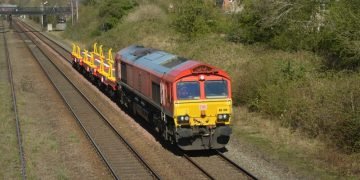By Eva Richardson | The Logistic News
April 17, 2025
Network Rail has taken proactive measures to secure the United Kingdom’s rail infrastructure projects by stockpiling a year’s worth of railway rails, a move that reflects the growing urgency to protect critical infrastructure from supply chain volatility.
“We cannot afford to pause infrastructure upgrades because of upstream uncertainty,” said a Network Rail spokesperson. “We’re securing continuity—whatever the outcome.”
Industry on Edge as British Steel Wavers
British Steel’s owner, Chinese conglomerate Jingye, is moving ahead with plans to shut down the two blast furnaces at Scunthorpe—jeopardizing over 2,700 jobs and threatening the UK’s domestic steel-making capacity. The Scunthorpe site currently provides over 80% of Britain’s railway rails, making it an essential node in the country’s land transport ecosystem.
The UK government has since enacted emergency legislation urging British Steel to source critical raw materials to keep blast furnace production running temporarily, amid fears that a full shutdown could destabilize national infrastructure timelines.
Diversifying Supply Sources
While Network Rail has long relied on Scunthorpe’s rails, the organization has supply contracts in place with Austrian manufacturer Voestalpine and German supplier Saarstahl. These European steelmakers, which operate electric arc furnaces (EAFs), have proven capable of delivering high-grade rail materials suitable for UK track systems.
Network Rail is currently building a new 25,000-tonne rail storage facility at Scunthorpe to support this contingency strategy and ensure availability through mid-2026.
“This is a smart logistics play—not panic buying,” said Elaine Crosby, UK rail infrastructure analyst at Transport ThinkTank.
Long-Term Sustainability Goals
While Network Rail focuses on continuity, British Steel has expressed its long-term ambition to transition to EAF-based, lower-emission steel production. However, the shift would require several years and significant investment, leaving a supply gap in the interim.
Eva Richardson is a senior correspondent at The Logistic News, reporting on supply chain resilience and infrastructure security across the UK and EU.























